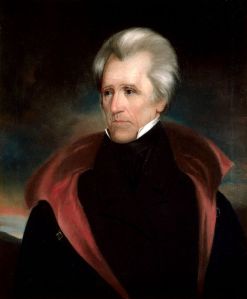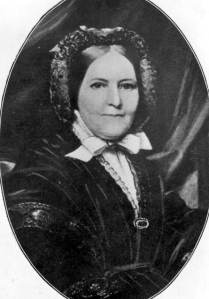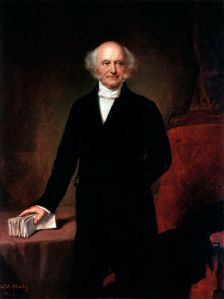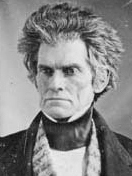In which we see a woman's status shape the outcome of a dangerous national controversy
- Andrew Jackson
Andrew Jackson was the quintessential man’s man.
—Don’t fuck with me.
Exactly.
—Do you regret teaching us this slogan, Mr. K?
Well, I wince a little when I hear all of you say it. But I think it works. You get what Jackson was about.
As I was saying, the masculine character of the Jackson administration is very much a matter of gender (as is, conversely, the virtual absence of women from the story to this point). You remember that Jackson had a wife, Rachel, over whom he dueled and to whom he was very devoted. You also remember that the Jacksons hailed from Tennessee, which was a frontier state, and indeed Jackson’s reputation as a frontiersman was part of his rugged appeal. But the flip side of that appeal is that people from the frontier can sometimes be regarded as unsophisticated, even backward. Rachel Jackson was sensitive on this matter as the couple prepared to move to the relatively (and I do mean relatively) cosmopolitan city of Washington DC after the election of 1828. And then, just after the election something shocking happened: she died suddenly of a heart attack. Jackson was convinced that his wife died of mortification about nasty gossiping behind her back, and was embittered about it for the rest of his life. And this is something crucial to keep in mind as we turn to the Tariff of Abominations, that law passed by the Jacksonians in the 1820s to hurt the Adams administration by placing very high tariffs on imported goods.
—OK. But what does Jackson’s wife have to do with the Tariff of Abominations?
I’ll tell you, Yin. The link is Mr. and Mrs. John Calhoun. As I said earlier, Representative Calhoun had run for president in 1824, and had spent his career as a nationalist War Hawk. In 1828, he accepted an offer to become Jackson’s vice president. But here’s the thing: by the early 1830s, Calhoun was moving more and more into the orbit of the South Carolina plantation aristocracy. That made him the chief spokesman against that tariff at a time when its critics were becoming ever more insistent.
—Yes, but how does Calhoun’s wife figure into this?
- Peggy Eaton
Floride Calhoun was an elegant and influential Southern woman very different than Rachel Jackson. She also appears to have been something of a moralist and something of a snob. When Jackson came to Washington, President Jackson named a man named John Eaton as his Secretary of War. Eaton’s wife, Peggy, was a saloonkeeper’s daughter. There were also rumors that she had cheated on her first husband, who had reputedly committed suicide over the affair. As a result, Calhoun and her friends froze Peggy Eaton out, refusing to visit her home or invite her to theirs. When Jackson learned of this, he became enraged: as far as he was concerned this was exactly the kind of thing that had killed Rachel. His anger over this dovetailed with Calhoun’s growing criticism of the tariff, which Jackson didn’t like either, but which he felt Calhoun was too strident about, particularly after the tariff’s critics began talking about leaving the Union if their demands weren’t met. The term they used was “Nullification.”
—Like the Virginia and Kentucky Resolutions.
Very good, Sadie. There was also another incident where angry politicians, this time Northern ones, had also threatened secession. Anybody remember that?
—The Constitutional Convention?
Well, yes, Kylie, there was talk of Georgia and South Carolina pulling out, though these were Southern states. I was thinking of the Hartford Convention.
—The War of 1812.
Right. Just before the Battle of New Orleans, which had put Jackson on the map.
- Martin Van Buren
Now, there’s one other person I need to bring in here, who I mentioned in passing earlier: Martin Van Buren. Van Buren, who came from upstate New York and was sometimes called “the Red Fox of Kinderhook,” is actually an important figure in American political history, because he’s really the first person you might call a “fixer”: someone who really organized campaigns and thought in terms of image and strategy, a role he played very effectively in managing Jackson’s political operations before and after he went to the White House. His primary nickname, “the Little Magician,” suggests his talents. There’s one other fact that important to mention here: Van Buren was single, and so he had no partner to get snagged in “the Petticoat Affair,” as the whole Eaton-Calhoun scandal was known. Recognizing which way the winds were blowing, Van Buren went out of his way to be nice to Peggy Eaton, visiting her frequently. Later, after he won the presidency himself, there was a joke that the political history of the United States got rewritten when Martin Van Buren touched Mrs. Eaton’s knocker.
—I don’t get it.
“Knocker” is a pun, Yin. It refers to a latch on a door that you use to signal that you’re at someone’s door, and a—
—Boob.
Thank you, Chris.
—That’s so lame.
—I think it’s pretty funny.
Either way, Van Buren was playing his cards right. And Calhoun was increasingly estranged from the president. Actually, you might say Calhoun tried to pull a fast one at a dinner party honoring Thomas Jefferson in the spring of 1832. The party was attended by a big Nullification crowd, and Jackson was asked to give a toast in the expectation that he would lend his support to the cause. After all, Jackson was a Southerner, a slaveholder, and a states’ rights supporter himself. How could he not publicly side with Calhoun, however he might have felt about him? But instead, Jackson said, “Our Federal Union—it must be preserved.” It was an awkward moment.
—Don’t fuck with me, John Calhoun.
Yes: that’s exactly what Jackson was saying, Ethan, and that’s how everyone in the room heard it. An angry and humiliated Calhoun got up and gave a toast of his own. He said, “The Union—next to our liberty most dear.” Thank about that for a minute.
—“Next to our liberty, most dear.”
Yes, Kylie. He’s damning the Union with faint praise.
— Don’t fuck with me, Andrew Jackson.
- John Calhoun
Right, Em. That’s also what he was saying. Calhoun was a pretty tough guy himself. Look at this portrait.
—Whoa. Scary.
Yup. But Jackson won this duel. Calhoun resigned as vice president after that to take a seat in the Senate, from which he would become one of the most powerful people in American politics. But his place was taken by our friend Martin Van Buren, who became Jackson’s hand-picked successor, and was elected president, an ambition that Calhoun was never able to realize. As we discussed, the presidency didn’t turn out so well for Van Buren, because he inherited the Panic of 1837. But the Little Magician would also be a real force in American politics despite that.
—So what happened with the tariff?
In 1832, Congress, with Jackson’s support, passed a new tariff that moderated the worst effects of the Tariff of Abominations. But this was not enough for South Carolina. It issued its famous “Ordinance of Nullification,” in November of 1832, which said that the state could ignore provisions of the 1828 as well as 1832 tariffs that it regarded as unconstitutional.
—He we go again. So what did Jackson do?
He sent the U.S. navy down to the South Carolina coast in December of 1832, threatening to invade. And then his supporters pushed through the a law known as the Force Bill—you can guess it’s meaning by its name, as well as Calhoun’s opposition to it. The law authorized Jackson to send ground troops into the state if it refused to comply with federal law.
—Don’t fuck with me, South Carolina!
That’s pretty much the size of it.
—What did South Carolina do?
What do you think, Sadie?
—They backed down.
Yes. They repealed the Ordinance of Nullification. In the months that followed, there was another revision to the tariff, which allowed South Carolina to claim that the state had won concessions. But most people at the time and ever since viewed this as Jackson’s force of will prevailing.
—I don’t really get why Jackson felt so strongly about a strong national government. In every other way, he was states’ rights.
—It was a pissing context, Yin. He couldn’t back down to Calhoun.
—Really, Adam? Was he that petty?
—Sure. The women were that petty. They even called it the Petticoat Affair. Why couldn’t the men be as petty as the women?
—This was too important. I don’t really like Jackson. But I don’t think he was stupid.
Some people did think he was stupid. When Harvard gave President Jackson an honorary degree in 1833, John Quincy Adams was among the alums who boycotted the ceremony. Jackson joked he couldn’t respect a man who only knew one way to spell a word. Go head, Kylie.
—Maybe there’s no big mystery here. He was states’ rights in most ways, but he loved his country because it was states’ rights. There had to be some rules that everybody agreed on.
—But he was being inconsistent.
—Yeah, Yin, but that’s just the way people are sometimes.
—I guess.
Emily, I want to go back to you. The other day, you voted for John Quincy Adams in the presidential election of 1824. Today, when we discussed economic policy, you came out as a Jacksonian.
—Came out, Mr. K?
Well, I wondered if you’re a closet Jackson supporter.
—I’m not a closet anything, Mr. K.
No, I guess not. I guess what I’m wondering is where you stand with Jackson now. Let me ask this: Will you be voting for Van Buren in 1836?
—Probably. He doesn’t seem to have the baggage Jackson does.
So are you saying that you like Jackson’s ideas, but not the man himself?
—I guess that’s what I am saying.
Oh good.
—Oh no. No “oh goods,” please.
Why not?
—Because “oh good” means you’re about to tell me something that’s going to make my brain hurt.
—No pain, no gain, Em.
—Oh shut up, Sadie. When’s the last time you went to the gym?
—I saw her there one Tuesday last April, Em. She’s been saying she has to go to the nurse every time she gets within five feet of the girls’ locker room.
—I do not, Brianna. I also bring doctor’s notes.
Well, we do have one more Jackson angle to consider. It involves women, and Indians. We’ll do that one tomorrow.
—I was just kidding about the doctor’s notes, Mr. K. Em and Brianna are lying. I really do go to gym. I hate it, but I go.
You’re a paragon of virtue, Sadie.
—Yup. That’s me. Off to math. Where we do parabolas, not paragons.
Next: the power of angry women



